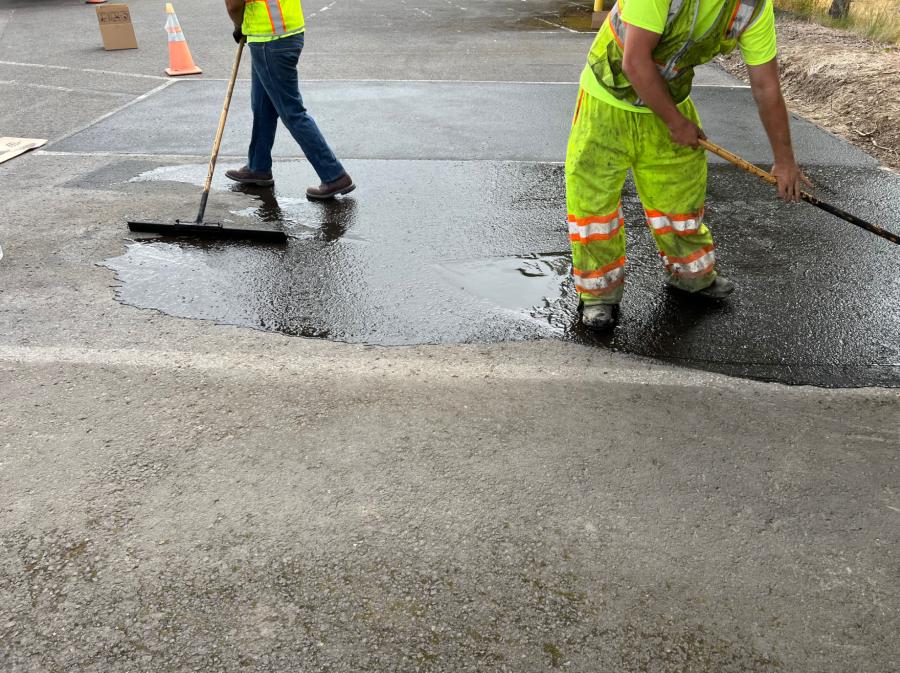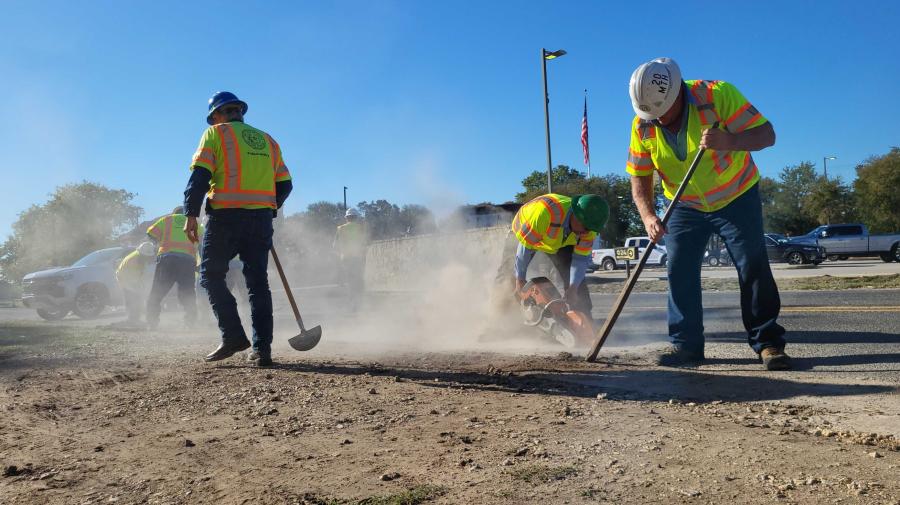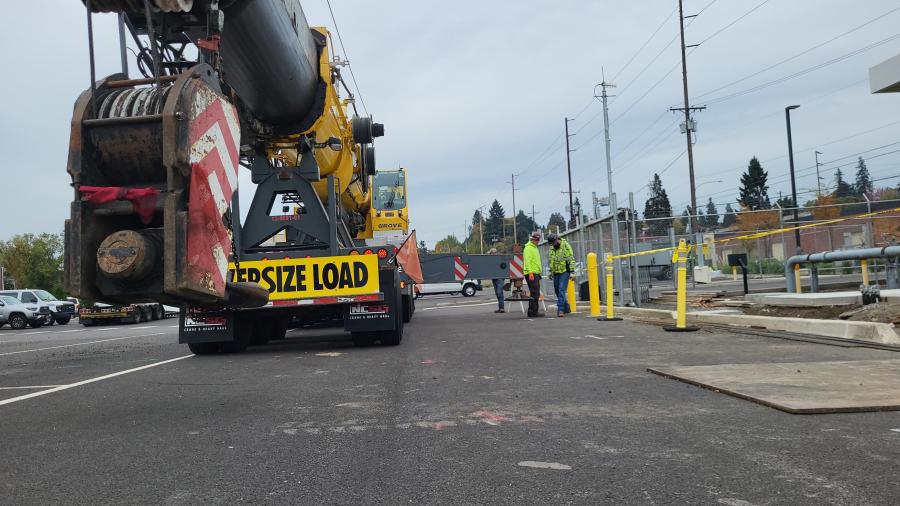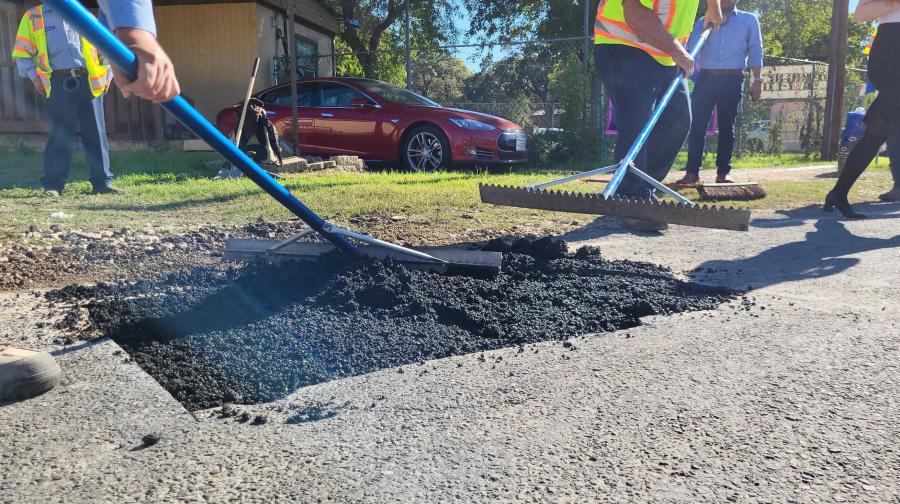Photo courtesy of Modern Hydrogen
In the process of developing a way to deliver “energy with a CO2 footprint that looks like renewables,” they discovered a way to reduce the environmental impact of paving roads with asphalt — one that sequesters carbon for centuries.
Modern Hydrogen, a start-up specializing in decarbonizing natural gas at the meter in order to deliver clean fuel for sectors traditionally difficult to decarbonize, set out to prove its hypothesis: stripping solid carbon from natural gas before combustion is a more practical approach to decarbonizing than managing gaseous CO2 — and can reduce the amount of harmful CO2.
Previous methods of reducing CO2 after combustion have proven complicated and expensive, according to Mothusi Pahl, Modern Hydrogen's vice president of business development and government affairs.

Photo courtesy of Modern Hydrogen
This new method substantially reduces costs as well as the embodied CO2 of asphalt, which contributes to the decarbonization of the natural gas sector, a known CO2 emitter.
"Capturing carbon before combusting natural gas — not after — could make decarbonization easier," Pahl said. "Nobody else has figured out how to decarbonize at the point of use."
In the process of developing a way to deliver "energy with a CO2 footprint that looks like renewables," they discovered a way to reduce the environmental impact of paving roads with asphalt —one that sequesters carbon for centuries. It also happens to enhance the quality of asphalt.
Extracting solid carbon from natural gas produces two products: clean hydrogen fuel and solid carbon, which can be used in asphalt to improve its strength and durability at a lower cost per lane mile because, according to Pahl, the solid carbon acts as a "binder strengthener" that reduces the amount of binder needed in hot mix asphalt.
Road to Economic Sustainability
Through a series of strategic partnerships, predominantly in Texas and the Pacific Northwest, Modern Hydrogen has been putting this solid carbon product to the test. Although there are currently more projects on the ground in the Pacific Northwest (including one in Alberta), Pahl said the first use of carbon-sequestered asphalt on public roads was implemented in San Antonio through a collaboration with Austin-based Road Recyclers and Bexar County Department of Public Works.
"Texas understands the requirements for hot mix," Pahl said.
There will be different mixes for different temperature bans. The "magical equation," Pahl said, is a mix that is strong when the weather is hot and flexible when it's cold. In addition to temperature, there are local operating requirements and traffic requirements that impact the design spec. For example, residential streets vs. county highways will vary. He said the company is working with its partners to optimize mix designs.
Bexar County Department of Public Works Director Tony Vasquez told the San Antonio Business Journal, "If you have a product that's eco-friendly but doesn't work, you can't use it or you shouldn't be using it. But one of the benefits of adding sequestered carbon to the mix is it makes it stronger, so that's what we're going to be looking at."

Photo courtesy of Modern Hydrogen
While Modern Hydrogen has only been field-testing carbon-sequestered asphalt for approximately 18 months, it has done extensive testing in the lab, where it has simulated accelerated wear, thermal cycling, oxidation and weathering. Through both testing and practical application, Pahl said, they have found "no impact on the expected useful life of any asphalt that's been deployed."
Nevertheless, development will continue in an effort to "improve performance at higher temperatures without reducing performance at lower temperatures," Pahl said.
It's an important focus, especially given the challenges of climate change and the potential for some areas to see temperature increases.
Another of its "aggressive objectives" is to reduce the cost per lane mile. While this new green asphalt technology substantially reduces the embodied CO2 in asphalt, Pahl said cost is an important aspect of the project. Fortunately, its multi-patented process of producing carbon-sequestered asphalt reduces costs at the same time it decreases CO2 emissions from natural gas.
"There's pressure to reduce embodied CO2 in asphalt," Pahl said. Although he believes that reaching zero CO2-level asphalt is a "Hail Mary," he asks, "What can we do to make roads cheaper and better and lower the CO2 equation? How can we do this quickly and economically — because if we can't afford to decarbonize, we won't do it. We have to make it a preferred economic pathway."
He's convinced that this "cost-efficient decarbonization technique, utilizing existing infrastructure, accelerates the shift towards a zero-carbon future." Furthermore, he said that these pilot projects are demonstrating the advantages of sequestered carbon asphalt as part of a sustainable, eco-friendly infrastructure that supports domestic energy security and more economical road construction.
Targets
"We're always looking at infrastructure," Pahl said, but, initially, Modern Hydrogen was unsure where its idea would best fit: concrete, structural fill, next-generation drywall?
"We looked at materials that need high-strength fill at a competitive price. Ultimately, they realized that the asphalt industry is ‘moving at light speed, comparatively,' so they began targeting asphalt companies and county highway departments in a two-prong approach."
Pahl said the project in Texas "transcends local boundaries, offering a blueprint for cities across Texas and beyond in environmental sustainability."

Photo courtesy of Modern Hydrogen
He goes so far as to describe it as a "call to action for government entities at all levels" to urge the adoption of clean energy and low-carbon strategies in public infrastructure. It stands as a model for municipalities statewide, he maintains, demonstrating the potential of sustainable, high-performance asphalt in urban planning.
The result is proving so effective, Pahl said he "wouldn't be surprised if other counties produce sequestered carbon road specifications."
In the meantime, however, Modern Hydrogen has to prioritize the allocation of its limited production.
That said, it also has formed a partnership with National Grid, a utility in New York and Massachusetts, to affect a "sea change in the type and use of fuel" used to power high-usage plants.
Acknowledging some push-back due to the fact that natural gas is obtained by fracking, Pahl said, "The big-picture takeaway is that there is no perfect solution [to reducing CO2 emissions]. But we must start someplace." He believes this process has two-fold benefits that can benefit the environment as it supports the quality of transportation. CEG
Lori Lovely
Lori Lovely is an award-winning journalist, editor and author of the children's book Isadora's Dance. She has worked for newspapers, magazines and niche publications, covering a wide-ranging list of topics that includes motor sports, construction, MSW, energy, environmental issues, water, animal rights and issues, history, Native American issues and people, real estate and home decor, farming and more. Her degrees in History taught this dedicated professional to research thoroughly and ask detailed questions in order to winnow interesting facts that convey the essence of the story. As a seasoned writer and compassionate storyteller, she accurately portrays the subject in a manner that entrances the reader.
When she's not working on assignment, Lori is tending to her historic Indiana farm, where she raises alpacas. An inveterate animal lover, this vegetarian enjoys spending time with her animals and working in her garden.
Read more from Lori Lovely here.
Today's top stories


















